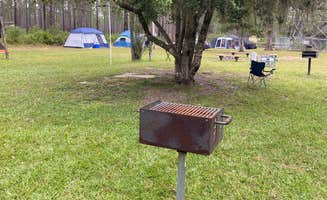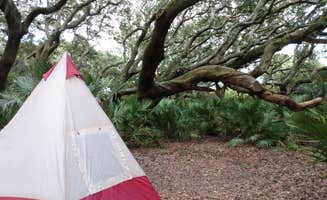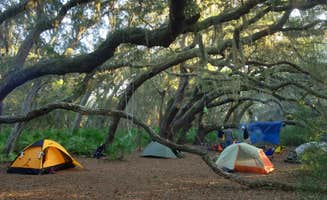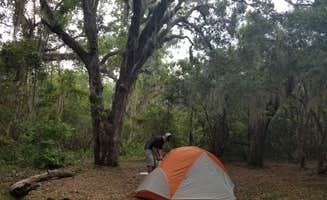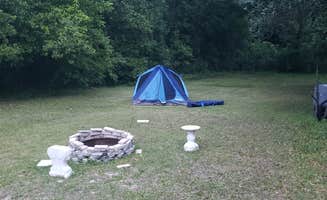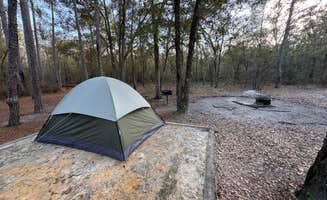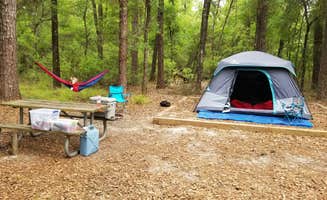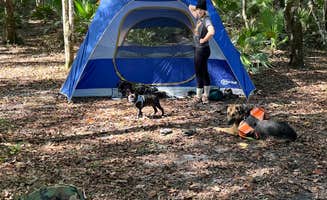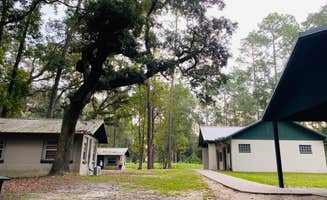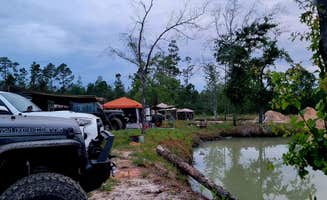Tent camping near Hilliard, Florida offers primitive experiences within mixed pine flatwoods and cypress wetlands at elevations ranging from 40-60 feet above sea level. During summer months, temperatures frequently exceed 90°F with high humidity, while winter nights can drop to the mid-30s. Campgrounds in the region experience seasonal flooding between June and September, affecting accessibility to certain sites.
What to do
Wildlife photography opportunities: At Cumberland Island National Seashore, campers can photograph wild horses on beaches and diverse bird species. "Wild horses running on the beach (and all over the island). Be sure to bring/rent a bike so you can explore all the interesting sites along the islands trails," notes Kelly M.
Explore historical ruins: The island features several abandoned structures including the Dungeness Ruins. One camper explains, "The ruins of an old mansion look like a much older archeological site. There are bathrooms and running (potable) water at the camp, and you're allowed to collect/burn dead wood in the area."
Paddle through wilderness swamps: Okefenokee Wilderness offers unique kayaking routes with primitive camping platforms. "This 2 night/3 day kayaking and camping trip on the Okefenokee Swamp in Georgia was filled with surprises. I knew there would be alligators but I did not expect the Okefenokee swamp to be so beautiful!" reports Randi T.
What campers like
Natural protection from heat: Live oak canopies provide significant temperature relief. "It was a hot time of year but under the canopy of the live oak trees where the tent sites are located was easily 10+ degrees cooler than elsewhere," shares one camper at Sea Camp.
Limited visitor access: Stafford Beach Campground restricts daily visitors, creating secluded experiences. "The island is only accessible by boat, and there are a limited number of people allowed on the island daily which means it is never over crowded," explains Kayla S.
Night sky viewing: Minimal light pollution creates excellent stargazing conditions. As one visitor describes, "Walking out on beach from tent every morning just to watch the sun rise over the Atlantic ocean while crab boats chug along being part of the scenery as the sun rises, you are first and only person on an 18 mile long beach until around 10 a.m."
What you should know
Ferry planning required: Cumberland Island access requires advance ferry reservations. "The only way to the island is by ferry, which is a big reason to pack light and efficiently," advises one camper. Round-trip ferry costs $30 per person plus $10 additional for bicycles.
Wildlife interactions: Jennings State Forest and other area campgrounds have active wildlife. "Keep all your food and scented items in the raccoon proof cages or make sure your coolers/food boxes are locked! Raccoons will pry open just about everything! Raccoons, hogs, and bobcats will make enough noise to keep light sleepers awake all night," warns Adela D.
Water treatment necessity: Many backcountry sites require water purification. "There is no potable water at Yankee Paradise. You will either need to fill your water up from a spigot at Plum Orchard or walk a bit down the parallel trail to find a pump," notes Sarah C.
Tips for camping with families
Site selection for amenities: Choose developed campgrounds for easier family camping. "I decided to do Sea Camp this time because I was camping with my mother and my three year old. It's the perfect campground for those who don't want to forego basic amenities," explains Marian K.
Educational opportunities: Hickory Hill and other wilderness sites offer wildlife education. "The resident volunteer led an info session on armadillos which was educational and fun and really added value to our trip," reports one visitor.
Transportation planning: Consider equipment for moving gear. "We used a wagon to carry to our stuff (and the kid) but the road terrain was pretty rough. If anyone is planning to bike on the road, I'd recommend they ensure their bicycle can handle that sort of surface," advises a camper with young children.
Tips from RVers
Access limitations: Most tent camping near Hilliard requires alternative transportation for RVers. "Whatever supplies you choose to go camping with, you will need to 'wheel it on' the actual ferry, which likely requires a hard examination of what really is essential versus 'nice-to-have'," explains Stuart K.
Drive-in alternatives: East Tower Hunt Camp provides basic drive-in sites with toilet facilities. "Camp has trash cans. There are several areas where you can be separate which is nice. There is no cell service. Tower is open where you can climb it if you want. Dollar general is only about 15 mins away," notes Hilary G.
Off-grid preparation: No electric hookups exist at most primitive sites. "There is no electricity or water except at the shower/restroom building that is near the campsites. You can borrow a cart to take your tent and supplies from the boat to the campsite," explains one visitor, highlighting the need for battery packs and minimal electronics.


